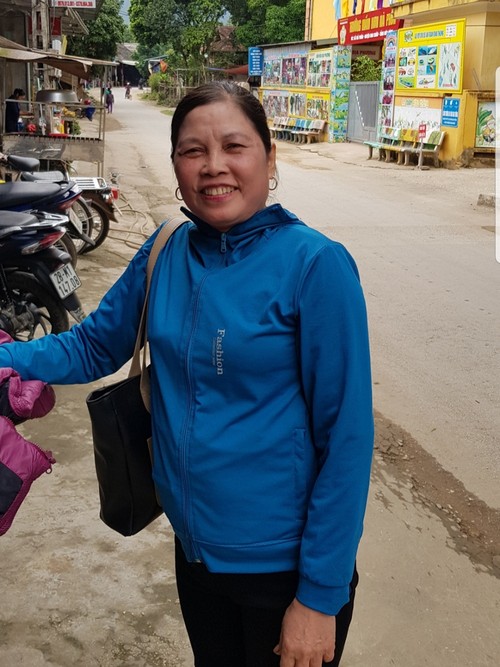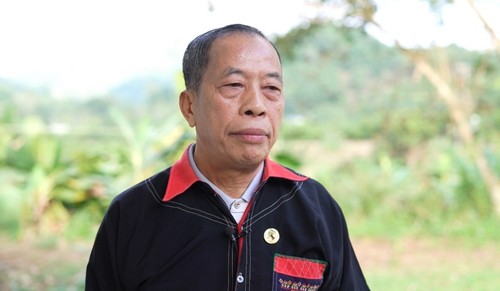 Meritorious artist Ha Thi Bich is a Thai ethnic prestigious person from Hoa Binh Province. (Photo: Ngoc Anh) Meritorious artist Ha Thi Bich is a Thai ethnic prestigious person from Hoa Binh Province. (Photo: Ngoc Anh)
|
The northern province of Hoa Binh province has a population of 870,000 people. 74% of them belong to the ethnic groups of Muong, Thai, Tay, Dao, and Mong, among others. Three thirds of 1,300 prestigious people in Hoa Binh are ethnic Muong.
Ha Ngoc Tuan, Deputy Head of the Provincial Committee for Ethnic Minority Affairs, said that with their experience and knowledge of the local situation, influential people have promoted communications work and mobilized the locals to abide by the Party’s guidelines and the Government’s policies and laws.
“They have set a great example by implementing socio-economic development models and poverty reduction programs in their localities. Every year, we organize meetings with prestigious people or create tours for them to learn the experiences from other successful provinces,” said Tuan.
The prestigious ethnic people always lead production, solidarity, and poverty reduction movements. Village elders and village chiefs consistently take the initiative in ensuring security and social order.
Ba Sinh Luong, a prestigious Dao ethnic resident of Hoa Binh City recalled, “I’ve mobilized my village peers to comply with the State’s guidelines and the Government’s policies. Whatever benefits the locals I will do. All the success, to date, is attributed to mass mobilization work.”
“As village elders and village chiefs take great roles and responsibilities, we make full use of every opportunity to mobilize people and especially by holding direct dialogues with them,” Luong added.
 Ban Sinh Luong is a Dao ethnic village patriarch in Hoa Binh Province. (Photo: Ngoc Anh) Ban Sinh Luong is a Dao ethnic village patriarch in Hoa Binh Province. (Photo: Ngoc Anh) |
Many prestigious people have inspired locals to keep alive their festivals, folk songs and dances, as well as performances on traditional musical instruments.
For example, meritorious artist Ha Thi Bich, a Thai ethnic resident in Mai Chau District, has promoted the conservation of Thai Khap singing.
“A Thai ethnic Khap club has been established involving 30 talented, enthusiastic people, both male and female of all ages,” Bich said, adding, “We often perform on holidays and festivals, or at wedding parties, house-warming celebrations, or full-month celebrations for a new-born baby. Khap melody has existed for years and been passed down from generation to generation,” said Bich.
Another outstanding prestigious ethnic person is meritorious artisan and cultural researcher Bui Huy Vong, who has collected artifacts, images and documents about Muong ethnic culture, particularly Mo Muong ceremonies, a unique cultural heritage of the Muong.
He has also been involved in restoring the Khenh Communal House Festival and the Du Voi Festival in Lac Son District.
Vong has translated the Muong language page on the Hoa Binh online newspaper and compiled ancient Muong language books.
Meritorious artisan Vong said, “The Government has agreed to the preparation of dossiers for Mo Muong ceremonies to be included in the UNESCO List of Intangible Cultural Heritage in Need of Urgent Safeguarding.”
“A number of other cultural heritages, such as Muong gong art, Khai Ha or the ‘Going Down to the Field Festival’, and Doi or the 'bamboo calenda’ of the Muong have been recognized as national cultural heritages. I have a big love for Muong folk culture.”
Prestigious people are contributing their time and knowledge to building and strengthening national solidarity, socio-economic development, sustainable poverty reduction, and promoting the local cultural identities.